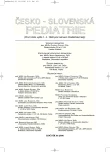-
Medical journals
- Career
Does Artificial Suckling Nutrition Pose a Risk of Atherosclerosis at the Adult Age?
Authors: A. Steinerová 1; F. Stožický 2; M. Korotvička 1; J. Racek 3; F. Tatzber 4
Authors‘ workplace: Medika-Centrum a. s., Plzeň vedoucí MUDr. A. Steinerová 1; Dětská klinika LF UK a FN, Plzeň přednosta prof. MUDr. F. Stožický, DrSc. 2; Ústav klinické biochemie a hematologie LF UK a FN, Plzeň přednosta prof. MUDr. J. Racek, DrSc. 3; Reagenzien und Recycling, Klosterneuburg, Austria 4
Published in: Čes-slov Pediat 2006; 61 (9): 519-523.
Category: Original Papers
Overview
Atherosclerosis has acquired the character of epidemic in our century. The acknowledged factors of atherosclerosis lately include the oxidation stress. Our workplace has been dealing with oxidation stress factors for more than 10 years. Since 1998 we noticed a high titer of AboxLDL antibodies in children, whose mothers could not practice breast-feeding and artificial nutrition based on cow’s milk was necessary. This paper demonstrates that the presence of beta-casein in cow’s milk is the cause of increased AboxLDL titer, especially the A1 variant of beta-casein. In the experiment in pigs, however, we have not demonstrated any association between the high titer of AboxLDL and the development of premature atherosclerosis.
Key words:
suckling nutrition, oxidation stress, antibodies against oxLDL, beta-casein, betacasein variants, atherosclerosis risk
Labels
Neonatology Paediatrics General practitioner for children and adolescents
Article was published inCzech-Slovak Pediatrics

2006 Issue 9-
All articles in this issue
- Apolipoproteins in Cherokee Children and Adolescents
- National Cholesterol Program in Children’s Population in Slovakia and Its Contribution
- Non-cholesterol Sterols in Healthy Children and Low Cholesterol Dietary Treatment of Children Suffering from Familial Hypercholesterolemia
- Dietary Habits of 9–10 Years Old Children from Pilsen City
- Primary Disorders of Lipid Metabolism in Children – Our Experience
- Food Supplements with Fish Oils – The Composition of Fatty Acids
- Does Artificial Suckling Nutrition Pose a Risk of Atherosclerosis at the Adult Age?
- Evaluation of Increased Levels of Neonatal Screening TSH in Slovakia
- What is New in the Diagnostics and Treatment of Arterial Hypertension in Children?
- Czech-Slovak Pediatrics
- Journal archive
- Current issue
- Online only
- About the journal
Most read in this issue- Primary Disorders of Lipid Metabolism in Children – Our Experience
- Does Artificial Suckling Nutrition Pose a Risk of Atherosclerosis at the Adult Age?
- Food Supplements with Fish Oils – The Composition of Fatty Acids
- National Cholesterol Program in Children’s Population in Slovakia and Its Contribution
Login#ADS_BOTTOM_SCRIPTS#Forgotten passwordEnter the email address that you registered with. We will send you instructions on how to set a new password.
- Career

